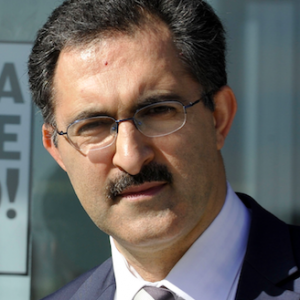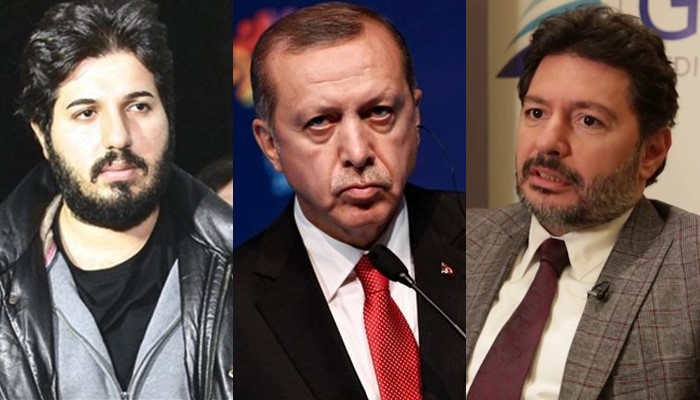by Abdullah Bozkurt
The number one concern for Turkish President Recep Tayyip Erdoğan while meeting with visiting Secretary of State Rex Tillerson on Feb. 15 was whether he and his family members were in legal jeopardy with the long reach of the US criminal justice system. The Turkish president wanted to take Washington’s pulse from the top US diplomat and assess what risks he may be facing for cozying up to Russia and Iran in violation of US laws and in open defiance of Turkey’s long-standing membership in transatlantic alliance.

First, he was apparently quite anxious to learn whether it would be possible to contain the fallout from an Iranian sanctions busting case in US federal court that incriminated him and his associates while convicting senior official at Turkish state-lender HalkBank Mehmet Hakan Atilla. Although the trial of one defendant was wrapped up, additional indictments and new cases may be in the pipeline. Second, the Turkish president was also curious to learn if special counsel Robert Mueller’s probe could be extended to his own clandestine operations on US soil that might have very well run afoul of US law.
The meeting was unusually long, three hours and 15 minutes, even with translation time factored in. There were neither official translators nor note takers at the meeting, which is also bizarre as it would mean a departure from the standard operating procedure we used to see for such high-level meetings. I suppose it should come as no surprise given the patterns we see in Erdoğan’s governance, which discarded many state traditions and replaced a parliamentary democracy with a one-man regime with no accountability and no checks and balances.
We learned of the order of business in this Erdoğan-Tillerson meeting from Turkish Foreign Minister Mevlüt Çavuşoğlu, the third person in the room who served as translator, when he gave a readout on Feb. 20 during an interview on Channel 24 News, a government mouthpiece run by Erdoğan’s loyalists. He listed legal cases as the number one category, which means Erdoğan’s foremost concern was how his own personal woes would play out rather than interests of national security. This vindictive Turkish leader is also frustrated over his futile attempts to convince American officials to extradite or at least temporarily detain his vocal critic, Fethullah Gülen, on fabricated evidence that his government provided to US authorities.
All other issues including the US military’s tactical cooperation with Syrian Kurds were nothing but a side show for Erdoğan, who has never shied away from abusing and manipulating sensitive matters as leverage to secure his personal ambitions. The US secretary of state did not seem surprised about what he heard during the meeting with Erdoğan and reportedly took notes without committing his government to anything. He couldn’t provide any guarantees even if he wanted to given the pressure the administration is under from Mueller’s probe into alleged collusion and conspiracy with the Russians during the presidential election campaign. What is more, Tillerson well knows that the executive branch cannot interfere in judicial matters.
In fact, when reading Mueller’s indictment of 13 Russian citizens and three Russian companies that were accused of conspiring to interfere with the US political system and election, one cannot help but think of similar charges possibly being levelled against Erdoğan’s long arm in the US. The leaked emails of Erdoğan’s son-in-law Berat Albayrak clearly show how Erdoğan’s henchmen in the US were funneling funds to members of Congress to influence US policy in violation of lobbying and campaign finance laws. The entities, masked under nonprofit organization schemes on US soil, were used by the Erdoğan government to engage in activities including exerting foreign influence to shape US policy without proper disclosure as required by law.
Perhaps the real trouble for Erdoğan emerges when his operatives, both foreign nationals and American citizens, used questionable and even illegal means to influence US policy without first registering with the Justice Department. In some cases, funds and logistical support were provided to organizations and persons to hold rallies to promote Turkish government views and policies without revealing their affiliation with the Erdoğan government. More than a dozen US organizations have links to the Erdoğan regime, but some stand out from the rest. The leaked Berat emails revealed how the Erdoğan family funded and organized anti-Egypt rallies in New York in November 2013. The operative, named Halil Danışmaz, who then led another front NGO called the Turkish Heritage Organization, reported to Albayrak and Erdoğan’s son Bilal that an Egyptian group was meeting every week under their care and that even the slogans on placards that were displayed at protests were prepared by Turkey.
Two pro-Erdoğan foundations, the Ensar Foundation and the Foundation of Youth and Education in Turkey (TÜRGEV), which are rooted in political Islamist activism with alarming jihadist leanings, jointly created the Turken Foundation in the US in June 2014, registered as a 501(C)3 not-for-profit educational organization with the US Internal Revenue Service. The evidence shows all of Erdoğan’s family members have been involved in getting the project off the ground. Erdoğan’s operatives have devised schemes to woo the US Muslim community as well through lobbying groups affiliated with the Islamic Circle of North America (ICNA) and the Muslim American Society (MAS). The Muslim Brotherhood is the main conduit for Erdoğan in reaching out to US Muslims. The Diyanet Center of America, a 20,236-square-foot mosque complex that was built in Lanham, Maryland, with $110 million provided by Turkey and run by Turkey’s Religious Affairs Directorate, is a hotbed of Turkish Islamist activity.
Perhaps, most troublesome for Erdoğan is his government’s illicit efforts to discredit, profile and harass the Gülen movement and even attempt to kidnap its leader Fethullah Gülen by forging connections with former officials of the US government. The damaging revelations were made by former national security adviser Michael Flynn, who admitted to lying to FBI investigators about a $600,000 contract in August 2016, while Flynn was advising Donald Trump’s presidential campaign. Flynn cut a deal with Mueller and his prosecutors to save himself and admitted that some of his prior disclosures were in fact false. In the statement of offenses, signed by Mueller’s senior assistant special counsels Brandon L. Van Grack and Zainab N. Ahmad, it was noted that Flynn falsely stated that he wrote on his own initiative an op-ed piece that was published in The Hill on Nov. 8, 2016 and smeared Gülen. The money trail pointed to the Turkish government.
According to a Wall Street Journal story published Nov. 10. 2017, Mueller has also been probing Flynn’s secret meeting with Turkish Foreign Minister Çavuşoğlu and Erdoğan’s son-in-law Berat Albayrak on Sept. 19, 2016 in New York where they discussed kidnapping Gülen from US soil. Former CIA director James Woolsey, who joined the meeting later, publicly disclosed the illegal abduction idea in an exclusive interview with the Journal in March 2017. The Journal reported that Flynn was allegedly offered up to $15 million to help remove Gülen under such a proposal. The September 2016 meeting was arranged by Ekim Alptekin, an Erdoğan operative who paid Flynn over half a million dollars for a smear article and production of a video to discredit Gülen, according to a story in The New Yorker published on March 16, 2017.
When thousands of troll and bot accounts that were funded and administrated by the Turkish government to run defamation campaigns against Erdogan’s critics including the US are considered, coupled with a relentless US bashing campaign personally led by Erdoğan in public speeches practically every day, one may very well conclude that there is a strong US federal case against this top Islamist thug and his associates. By raising the stakes such as arresting US citizens and US consulate employees, filing frivolous criminal complaints against senior US officials and undermining NATO alliance joint cooperation schemes, Erdoğan is trying to gain leverage and negotiate from a strengthened position. His ultimate goal is to contain the fallout from Atilla’s case in New York and perhaps other cases that are reportedly lined up against him and his associates.
It remains to be seen how much the US administration is willing to bend to accommodate Erdoğan. But judging from Tillerson’s criticism of the Turkish government during a joint presser with the Turkish foreign minister the day after he met with Erdoğan and more bashing of the US by Turkish officials afterwards suggest the US secretary of state did not provide clues to allay Erdoğan’s personal concerns about legal troubles the Turkish leader may be facing down the road. This means a disgruntled Erdoğan would likely escalate the tension further by risking more confrontation with the US, which may not be limited to the Syria file. The deliberate raising of tension in the Aegean and picking a fight with Greece and the Greek Cypriots may be one way to go to irritate the US, which would be forced to intervene as it did in the 1996 Kardak/Imia crisis. The cutting off of access to İncirlik Air Base in the Turkish province of Adana and dismantling a NATO radar base in Malatya province may even be on the table according to commentary from the Turkish foreign minister.


